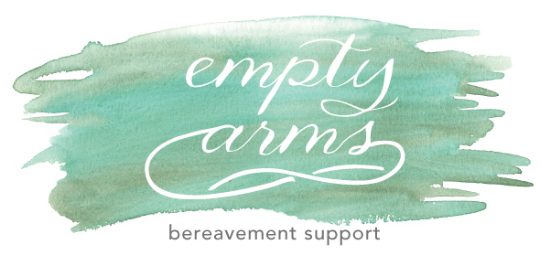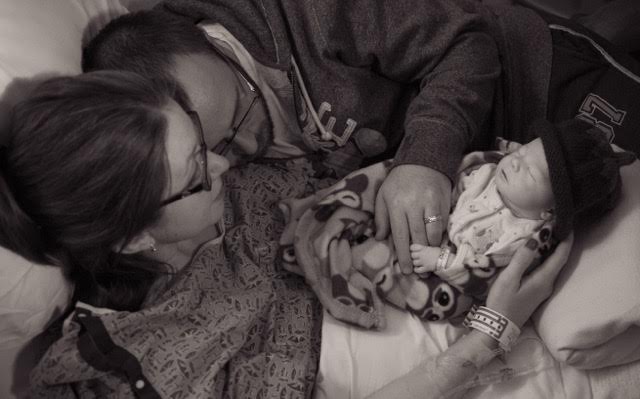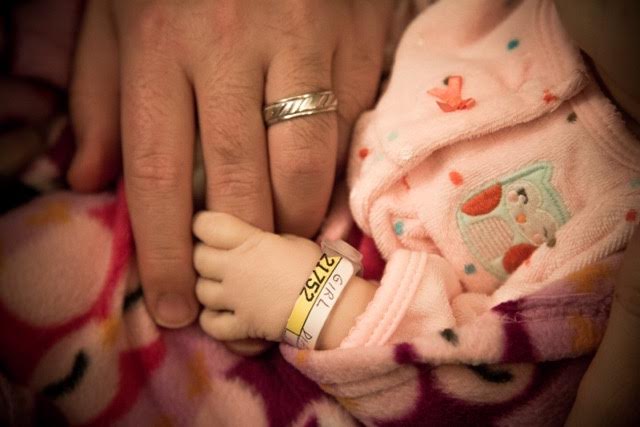Empty Arms is highlighting our beautiful community members and their babies. We’re so grateful that they’re sharing their stories with us!
Tell us about you.
My name is Kate Dias. I am a registered nurse, born and raised in Western Massachusetts. My husband (Jon) is a teacher, also born and raised in Western Massachusetts. We are the parents of two daughters, one who is with us and one who is not. Our missing baby remains in our hearts and is very much a part of our day-to-day living.
Tell us about your baby or babies. What do you want people to know about them?
Our first daughter, Emma Elizabeth, was 6 lbs 4 ounces, 20 inches long. She had a perfect little nose, flawless skin, big hands and feet, and a little crooked toe on each of her feet. She barely had any hair, just a little bit of peach fuzz that was kind of reddish in color. She was due December 17, 2014 and had been a very active baby in utero. I used to joke that the first thing I would do was grab her feet to get a good look at the weapons she used to kick my ribs. I went into labor December 7, labored for 28 hours, and in the morning of December 8 things inexplicably and unexpectedly changed. Emma had been handling labor “perfectly,” but then she didn’t. I was rushed to the OR for an emergent c-section but Emma died before she could be delivered. We were able to hold Emma and have her body with us for 38 hours after she was born. That was instrumental in our grief journey. Those are the moments I cherish the most with her. I was able to spend time dressing her, holding and kissing her, talking to her, and just feeling her close to me and in my arms. I didn’t realize it at the time, but that was so incredibly important and really shaped the memories of and connection I have with her today. Emma’s grandparents, uncles, aunt, and extended family members were able to come see her, hold her, and show her how much she was and is loved. We had Emma cremated and have her ashes in a beautiful glass urn. We were able to receive hand and foot castings, ink handprints and footprints, and professional photographs of our baby. We display our Emma mementos and her urn in an area of our house dedicated just to her. We also have some really beautiful photos of Emma sprinkled in rooms throughout our house. She is very much a part of our daily lives and is mentioned daily in some way or another. Emma has shown us what truly matters in life.
Our second daughter, Grace, was born April 2016, 17 months after Emma was born. Grace came sooner than expected, but much to my relief she was born alive and healthy. She was 6 lbs 8 ounces and 19 inches long. We chose the name because we felt like she was a gift of grace during our grief. Unlike her older sister, Grace had a head full of wild hair. She looked a lot like her older sister, even having the crooked toe on each foot. We had some feeding issues immediately after birth, and Grace developed jaundice and required light treatment for it, but everything eventually got back on track. I remember asking why things had to be so challenging after her birth. Hadn’t we already paid our dues? I felt like we deserved an easy road after what we had already experienced with Emma. It was frustrating. Also, I wasn’t ready for the comments people made assuming Grace must make Emma’s death a little easier to deal with. That angered me the most. Grace is our second child–a continuation of our family. What I wish the most for people to understand is that although she followed Emma, Grace is not a replacement for the baby we lost.
How did your baby and your grief journey change you as a person?
Emma’s arrival and her death have changed my perspective on life. Certain things that once bothered me now seem insignificant. Material possessions now have no meaning. I also feel like I have little to no sympathy for people who choose to create and focus on drama that they willingly create for themselves. Conversely, what I have found is deep empathy for those who are experiencing terrible things that they have absolutely no control over.
Another way I am changed is in my ability to give any of myself to other people. My job requires an ability to provide compassionate care and support to patients and their families. It requires a lot of energy and a certain amount of emotional reserve to tap into when need be. It was particularly difficult for me to provide emotional support to anyone (family, friends, or patients) in the first year after Emma died. It was hard to give to others when my own emotional reserve was depleted. It has changed somewhat over time, but I find it sometimes is still hard.
Is there a way that you can pinpoint a change in your healing and grief journey because of your relationship with Empty Arms?
I know that I felt like I had been dropped into this deep, black abyss the day Emma died. Everything that I thought was my life now looked completely different. I remember being in my hospital bed thinking, ”I am supposed to live after this?” Any thoughts of healing or putting a shattered life back together seemed insurmountable and impossible. Our first contact with Empty Arms was through their companion program, when Carol came to our hospital room the evening of the day Emma died. She introduced herself, sat down next to us, shared her story, and shared with us the ways Empty Arms can help. I don’t remember what exactly she said, but I remember how it made me feel, which was less alone and hopeful that I could maybe, someday, be in a place where I, too, would be a survivor. It meant so much for someone to come into our room, look at our baby, and see past the fact that she was dead. Carol commented on her little face, and how beautiful she looked. She validated our baby’s existence. I could see that I was facing was painful and hard road, but there was someone who could hold onto the hope that I would eventually be living a meaningful, functional life again, even though I felt like it could not possibly exist.
The Empty Arms support groups have been instrumental in my healing as well. It is healing having a space where I can talk about my daughter, not be judged, and say the things about baby loss that my non-baby loss friends could never relate to. Coming into a group and sharing my feelings and experiences, then having other people in the group share that they have had similar feelings or experiences has helped normalize a lot of the ways grief affects me.
Another way Empty Arms helped was during my subsequent pregnancy with Grace. I was terrified throughout the entire pregnancy. I was constantly waiting for the other shoe to drop, so to speak. It felt like death or tragedy was right around the corner. I had no pregnancy milestone to pass where I could take a deep breath and think, “We’ve made it farther than we did with Emma.” The only time this pregnancy would be different is if Grace was born alive. I participated in the Subsequent Choices support group with several other loss parents. Having that space to voice my grief for my dead baby and the tempered excitement over our new baby was instrumental in helping me make it through the pregnancy. Many non-bereaved people I knew couldn’t understand why I was worried or so anxious about this pregnancy. Someone actually told me, “I have never heard of this [meaning stillbirth] happening twice.” Yes, it does happen, and yes, I was worried about it. Many of the other people in the group worried about it, too. We all had common fears and feelings regarding our subsequent pregnancies. It was helpful to have that support.
In what way do you think your connection with Empty Arms and its members has reached outwards to impact other people in your network?
One of the ways Empty Arms has allowed us to reach outwards and affect others is by allowing us to have a fund in our daughter’s name that is designated for a specific use. In lieu of funeral flowers, we asked that donations be made to Empty Arms. We didn’t have a specific plan for the funds at that time, other than we wanted to give back to an organization that had been helping us from day one. A few months after Emma’s funeral, Carol talked with us to see what we would like to have the donation money put toward. Her thoughtfulness and willingness to incorporate us into the decision making was a huge gift to us. My husband and I decided to create the Emma Dias Fund (or Emma’s Fund) to serve two purposes. The first is that we really want to help cover costs of the photography printing and delivery for families. Our personal experience with this was hard. We had a few hoops to jump through when we tried to get photographs printed for Emma’s funeral. In between crying and lying in bed waiting for the days to pass, it was very difficult to make phone calls or try to get things sorted without outside help. My husband and I decided we wanted to make it easier for families to have that type of service available (if a family feels like it would be helpful to them).
Our second purpose for the fund is to help educate nurses on compassionate caregiving regarding perinatal loss. Nursing education is something near and dear to my heart, and I felt like providing this education to future nurses would be valuable to both the nurses and their future patients. The hope is that all local nursing schools will make space for this lecturing. Right now there are several schools who are utilizing this service. In addition to nurses, Emma’s Fund recently helped support education to OB-GYN residents at an area teaching hospital.
We were able to create Emma’s legacy, which we hope will help our community and those who are thrust into the club no one wants to be a part of.
What else would you like to see Empty Arms accomplish? How do you envision the organization could make that happen?
It saddens me to know that there are some area hospitals, OB GYN practices, and other medical facilities that do not utilize the services provided by Empty Arms. Whatever the reason, it is important that these services be available for bereaved families. It was really so important to my healing that someone came to me, in my hospital room, on their own time, to offer their help and guidance on the worst day of my life. The support continued through the following weeks, months, and now years. To not be aware of this organization and its resources is a real disservice to our entire community.


